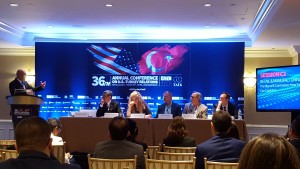 Did you sign up for our upcoming event “Working with a Global Mindset on the U.S. – Turkey Commercial Highway”?
Did you sign up for our upcoming event “Working with a Global Mindset on the U.S. – Turkey Commercial Highway”?
he Turkish Statistical Institute announced a 7.4% growth rate earlier this year. Oya Narin, the Head of Turkish Tourism Investors Association said in an interview that 2018 will be a time for transition and rise for Turkey. Turkish investors and business people continue exploring U.S. markets via personal trips, trade missions and the SelectUSA Conferences. At the same time, economic analysts express concerns about key financial indicators of Turkey.
The value of a global mindset is amplified in our interconnected world especially when stakes are high. The “reciprocal understanding” through the global mindset enables us to build relationships, communicate effectively, give feedback, negotiate and solve conflicts to achieve desirable results across cultural, administrative, geographic and economic divides.
Experience exchange and being well informed are critical when working in new markets. Members of the American Turkish Council (ATC) can register at ATC member rate. The participation of business people with and without experience in this bilateral relationship will enrich the content and functionality of this webinar. We hope for a diverse attendance.
Did you know? Some Facts about Business in Turkey
There are over a thousand U.S. businesses doing business in Turkey. Large American companies like GE, Pfizer, Merck, P & G, Unilever, Coca Cola, Pepsi, IBM, Hilton, Ford have had headquarters in Turkey for many years with GE since the 1940s. More recent additions are Microsoft, Amgen and Amazon. Many of these firms have their regional operations in Turkey.
Turkish Airlines flies to the highest number of international destinations in the world. The airline has ranked as the best European airline for consecutive years and its philosophy is “Globally Yours”.
Turkish people are proud of (emotionally connected to) their brands. They’ve trusted the now internationally growing brands like Ülker (food), Arçelik (appliances), Mavi Jeans (textiles and fashion), Doğan Construction (construction) and Turkish Airlines (airlines) for decades.
Forty percent of small and mid-size businesses are involved in trade in Turkey. Many of these are dynamic family businesses with much experience in European and Asian markets looking to grow through bilateral and international collaborations. Turkey has also moved up on the Bloomberg Innovation Index. The geographic distance that gets perceived strongly and mentioned much more often than cultural differences by traditional small and mid-size businesses doesn’t appear to be a challenge to the innovation community of Turkey.
People address each other with Mr. And Ms. titles for a long time into the relationship or until a mutual agreement is made for first name basis. We will discuss this topic during the webinar.
Did you know? Some Facts about Business in the United States:
There are 50 states with their own rules and regulations. Many federal rules and regulations impact a foreign market entry such as the FDA regulations for incoming biotech firms. Additionally, there are many state and local rules and regulations that impact business incorporations, taxes, employment and other business areas.
Much meaning is packaged into words. You may receive a note saying “we have a 60-day cancelation policy” will remind trusted friends, colleagues and legal advisers in the United States. While understanding rules, regulations and contractual relationships raises the importance of working with good legal counsel this cultural nuance also results in helpful public content on websites and social media.
Business world and brands trusted. The business entity is expected to be a trusted institution. Brand reputation thrives through the brand promise, strategic communications and trustful customer relationships. Business leaders recognize the importance of corporate social responsibility towards the communities and the larger society.
Less than 10% of American small and mid-size businesses are engaged in international trade. Also, often times, a large portion of the trade in a company can be with only one country.
About a quarter of Fortune Global 500 are headquartered in the U.S. In addition to having businesses that were started in previous centuries on the list, the American business world is quick to send 21st Century model businesses like Airbnb, Uber and Tesla into the global business space.
Collaboration can help learn from each other and thrive internationally and globally
Being able to leverage cultural differences can result in innovation, productivity and effective global storytelling. We will compare the GlobeSmart® profiles of the United States and Turkey during the webinar. This will allow us to discuss some of the cultural nuances of the two countries. Diverse teams thrive when their leaders are educated in leading across diversity and global trends, and when team members are aware of differences and similarities.
Being able to leverage differences in business experience and geographic location can also enhance the empathy levels, relationship building capacity and global reach of diverse teams.
We recommend researching the nuances and history of this high potential bilateral relationship, and look forward to great conversations on June 6, 2018.
Unlocking the Global Mindset Energy Well: IKIGAI: The Japanese Secret to a Long and Happy Life, a book authored by Héctor García and Francesc Miralles is being discussed in the international business community, too. “Eat until you’re 80% full” is one of the recommendations.
